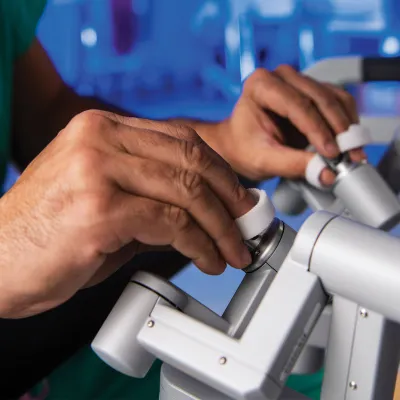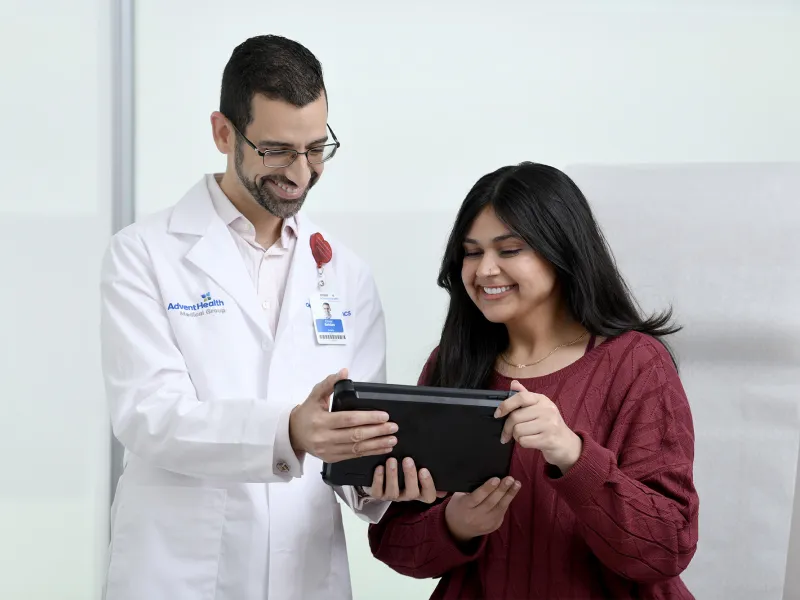
Better Ways to Treat Gallbladder Symptoms
This page is primarily about treatment for benign gallbladder diseases. For information about malignant gallbladder conditions, please see the page for gallbladder cancer.
The gallbladder is a sac that stores bile made in the liver. After you eat a meal, the gallbladder releases this bile into the top part of the small intestine to help you digest fats. Unfortunately, gallbladder problems are quite common. Usually related to gallstones, gallbladder diseases can happen to anyone but tend to affect people who are older than 40, overweight or female.
Common gallbladder conditions include:
- Gallstones (cholelithiasis or cholecystolithiasis)
- Cholecystitis (inflamed gallbladder)
- Abnormal gallbladder contractions (biliary dyskinesia)
The advanced general surgeons at the AdventHealth Digestive Health Institute have dedicated experience with surgery to treat gallbladder conditions. Surgery is the only treatment that can cure a gallbladder disease. While gallbladder removal — cholecystectomy — is one of the most common general surgeries, our surgeons use minimally invasive methods that help patients avoid complications and experience faster recoveries. Our surgeons even offer epidural gallbladder surgery so that patients who want to can avoid general anesthesia.
Whole-Person Care for Gallbladder Disease
Gallstones form when bile develops into hard particles. These stones can be as small as a grain of sand or as large as a golf ball. If one of these stones blocks the major bile duct that comes out of the gallbladder, the result is acute cholecystitis or “gallbladder attack” – severe inflammation in and around this organ. Gallbladder attack requires immediate medical attention. Otherwise, the gallbladder could rupture, a life-threatening situation.
Symptoms of gallbladder attack include:
- Pain on the upper-right side of the abdomen
- Nausea
- Vomiting
- Fever
Many patients do not even know they have a gallbladder disease until they have a gallbladder attack. However, other patients experience symptoms of gallbladder disease more gradually.
Gallbladder disease symptoms that may appear more gradually include:
- Pain mostly the right side of the abdomen, which may radiate to the back
- Abdominal pain after eating
- Intolerance of fatty foods
- Nausea, vomiting, and loss of appetite
- Bloating, gas, and indigestion
With some exceptions, treating gallbladder conditions with medicine has fallen out of favor. This is because surgery provides a permanent cure and today’s gallbladder surgery is very minimally invasive. When not used as emergency treatment, gallbladder removal, or cholecystectomy, does not usually require an overnight hospital stay. Because cholecystectomies are so commonly needed, surgeons have a lot of experience performing them. This also makes gallbladder surgery very safe.
In the cases where patients are unable to have surgery, some medical treatments for gallstones may provide symptom relief.
Medical treatments for gallstones include:
- Oral medication. Ursodeoxycholic acid, a bile acid, can dissolve small (1.5 cm or less) gallstones made of cholesterol. This approach works for about 40 percent of patients with these stones.
- Medicine given by infusion. Some stones can be dissolved by solvents such as methyl tert-butyl ether or monooctanoin. These need to be infused directly into the bile duct or gallbladder.
- Endoscopic retrograde cholangiopancreatography (ERCP). When a gallstone is blocking part of the bile duct is shares with the pancreas, sometimes an ERCP procedure can be used therapeutically. This minimally invasive approach performed with an endoscope removes the gallstone from the duct, thus ending the blockage.
Surgery that removes the gallbladder is a permanent treatment for gallbladder conditions. Please see the Cholecystectomy page for information on the minimally invasive procedures offered at AdventHealth Digestive Health Institute to treat gallbladder disease.
Pancreatic, Biliary and Gallbladder Disease
-
Pancreatic Cancer
Our surgeons are among the region’s most experienced in pancreatic surgery. We can help treat your cancer with minimally invasive options. Learn more today.
-
Pancreatic Conditions
Gastroenterologists and surgeons at AdventHealth Digestive Health Institute are experts for treating Pancreatitis, Pancreatic Cyst and other conditions of the pancreas.
-
Pancreatic Surgery
AdventHealth Digestive Health Institute's pancreas surgeons offer minimally invasive pancreatectomy for Pancreatitis, Pancreatic Cysts and Pancreatic Cancer. Learn more.
-
Gallbladder Cancer
Removing the gallbladder with cancer is a very complex surgery that requires highly experienced surgeons like those at AdventHealth Digestive Health Institute.
-
Gallbladder Conditions
Advanced surgeons at AdventHealth Digestive Health Institute provide cholecystectomy and other treatments for gallbladder pain and gallstones.
-
Gallbladder Surgery
Surgeons at the AdventHealth Digestive Health Institute provide advanced, scar-less cholecystectomy for gallbladder pain and gallstones.
-
Bile Duct Diseases and Conditions
AdventHealth Digestive Health Institute gastroenterologists and gastrointestinal surgeons treat bile duct obstruction (blocked bile duct) and cholangiocarcinoma (bile duct cancer).
-
Endoscopy for Pancreatic, Bile Duct and Gallbladder Conditions
Gastroenterologists at AdventHealth Digestive Health Institute use ERCP and endoscopic ultrasound to diagnose and treat pancreas, gallbladder and bile duct diseases.

Recover Faster With Minimally Invasive and Robotic Surgery
The expert surgeons at the AdventHealth Digestive Health Institute have a large depth of experience in offering minimally invasive surgery.

Meet Your Dedicated Experts
Our specialists are passionate about providing collaborative care that addresses your unique needs and goals while ensuring you feel informed and supported every step of the way. Learn more about our team and their areas of expertise.

Surgical Consultations For Digestive Cancer Without the Wait
Appointments Within Seven Days for Patients with Cancer
At AdventHealth Digestive Health Institute, we know that after being diagnosed with cancer, patients want and often need to begin treatment quickly. So we make it a priority to offer appointments for cancer surgery consultations within five business days, and often earlier.
Patients who are newly diagnosed with cancer, or have just found out they have cancer again, qualify for this priority access. Our surgeons will make themselves available to see you right away, even for a second opinion. We want to help you start your treatment as soon as possible.
Let Us Help You Feel Whole Again
Whether you’re experiencing new symptoms or want a second opinion on a diagnosis, our dedicated digestive health experts are here to help you find answers and a path forward. Request an appointment today to take charge of your health and get the personal support you need.
